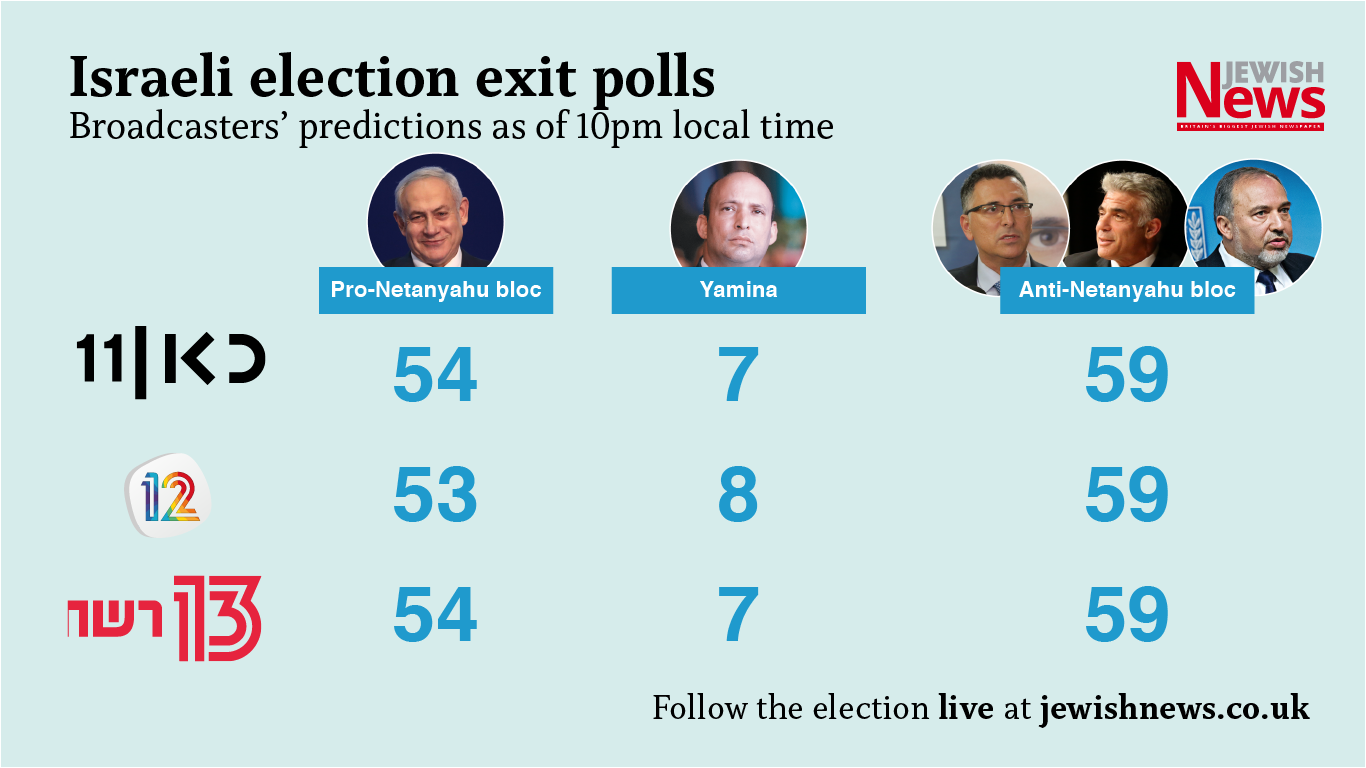Bennett’s gradual, patient mission to succeed Bibi
Nathan Jeffay thinks back to the first time he met Naftali Bennett eleven years ago, when peers dismissed him as an outsider.
“He’s like a U.N. spectator — he’s an outsider,” grumbled settler leader Daniella Weiss when I asked her about the choice.
But Bennett used his Yesha Council post to jump into politics just as the main pro-settler party, Jewish Home, was in dire straits.
He then started blurring the lines of right-wing Israeli politics.
For the 2013 election he placed a secular woman, Ayelet Shaked, high on the list of this party that had always been dominated by kippah-wearing men.
What prospects for UK-Israel relations?
Richard Pater of the UK-Israel think-tank Bicom says the signs are that relations between the two countries will prosper, irrespective of who becomes — or stays on as — prime minister.
Both countries remain heavily invested in the mutually beneficial bilateral relationship, be it trade, a vibrant scientific and academic cooperation and excellent security ties.
The state of play at 2pm Israeli time
• With nearly 90% of the vote counted, neither major bloc in Israeli politics has a clear route to a Knesset majority
• The parties supporting Benjamin Netanyahu for prime minister have 52 seats
• The parties opposed to him stand at 56
• The stance of two parties remains unclear: Naftali Bennett’s Yamina, on seven seats, and the conservative United Arab List on five
• Voter turnout, at 67.2%, was lower than any election since 2013
• This election seems has delivered the strongest far-right contingent in Israel’s history to the Knesset
• It’s been a disappointing election for Gideon Saar, who broke away from Likud in December and may only win six seats
• Labour’s Merav Michaeli hailed her party’s revival after it appeared to be comfortably over the electoral threshold
Final update at 3am
• Israel’s main broadcasters all predict a deadlock between pro- and anti-Netanyahu blocs in the Knesset after Tuesday’s election
• In the hours after the polls closed no party leader declared they had a route to a stable government
• The figures suggest Benjamin Netanyahu’s Likud will win around 31 seats, but that Naftali Bennett’s support would not be enough to deliver a majority
• Bennett, whose Yamina party seems unlikely to break into double figures, did not commit himself to either side of the divide
• Yair Lapid, the leader of the largest anti-Netanyahu party, did not declare himself a candidate for prime minister
• This election seems certain to have delivered the strongest far-right contingent in Israel’s history to the Knesset
• It’s been a disappointing election for Gideon Saar, who broke away from Likud in December and may only win six seats
• Labour’s Merav Michaeli hailed her party’s revival after it appeared to be comfortably over the electoral threshold
• Another unexpectedly strong performer was Benny Gantz’s Blue & White, despite predictions that it would fall short of the threshold
• Voter turnout, at 67.2%, was lower than any election since 2013
With that, the Jewish News’s live coverage of this election draws to a close for now. Thank you for your company this evening.
Vote counting underway
Around 7% of actual votes have been counted so far and the process is likely to extend well into tomorrow.
One surprise we may notice is the United Arab List, so far predicted to be below the electoral threshold, to have eeked out enough votes to get into the Knesset. That could upset the balance in the chamber quite significantly.
Netanyahu remarks over
And he’s done. Netanyahu made a point of saying he would speak to “all members of the Knesset” — which is different from “all leaders”, as it suggests he may look at pinching members of opposition parties in the hope of building a majority for himself.
But having watched four self-declared “victory” speeches by Netanyahu over the past two years, I have to say this was one of the most muted.
Netanyahu speaking
 So far, the prime minister has touched on Israel’s vaccination programme, the Abraham Accords with Arab countries and the threat posed by Iran.
So far, the prime minister has touched on Israel’s vaccination programme, the Abraham Accords with Arab countries and the threat posed by Iran.
There’s a clear majority in the Knesset for a peace with Arab countries that does not involve uprooting Jewish communities, he says, adding: “We must form a stable government from this.”
“We must by no means drag Israel to fifth elections. Set up a stable government now.”
Netanyahu speaking
 “Tonight we have brought an incredible achievement,” he says. The Likud is the largest party in Israel by a very large margin.
“Tonight we have brought an incredible achievement,” he says. The Likud is the largest party in Israel by a very large margin.
It’s the biggest gap between the top two parties in Israel’s history, he says.
Note that he hasn’t claimed outright victory.
Netanyahu speaking
He’s emerged — not looking his happiest, it must be said.
Lots of people in the crowd shouting “Bibi, we love you!”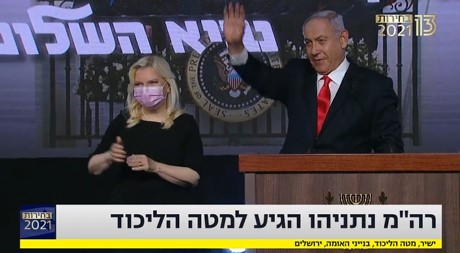
Netanyahu due to speak
A speech has just been placed on a podium and Channel 12 has switched to a live backstage shot. The prime minister’s arrival could be imminent.
Waiting for Bibi
Loud music is being blared in the hall where Benjamin Netanyahu is expected to speak, likely to keep Likudniks cheerful as the clock ticks towards 2.15am on a Wednesday morning.
Israeli television is showing pictures of the hall, which is somewhat awkwardly divided between empty seats for dignitaries at the front and a pen of flag-waving supporters towards the rear.
Hard to ignore how empty the hall is.

2am update
• Israel’s main broadcasters all predict a complete deadlock between pro- and anti-Netanyahu blocs in the Knesset after Tuesday’s election
• The figures suggest Benjamin Netanyahu’s Likud will win 31 seats, but that Naftali Bennett’s support would not be enough to deliver a majority
• Bennett, whose Yamina party seems unlikely to break into double figures, did not commit himself to either side of the divide
• This election seems certain to have delivered the strongest far-right contingent in Israel’s history to the Knesset
• It’s been a disappointing election for Gideon Saar, who broke away from Likud in December and may only win six seats
• Labour’s Merav Michaeli hailed her party’s rival after it appeared to be comfortably over the electoral threshold
• Another unexpectedly strong performer was Benny Gantz’s Blue & White, despite predictions that it would fall short of the threshold
• Voter turnout was reported to be lower than any election since 2013.
Why does 61 matter?
61 is the number of seats required for a Knesset majority, and the bulk of our coverage is geared towards whether Israel can form a government.
That’s a difficult prospect for the anti-Netanyahu bloc because it contains some parties — Yisrael Beiteinu and the Arab Joint List, for example — that would refuse to sit alongside each other in government.
But 61 seats means other things too. It’s enough to elect the next speaker of the Knesset, and it’s enough too to pass a law that would ban anyone facing criminal charges from becoming prime minister.
So Benjamin Netanyahu, whose long-running trial continues in a matter of weeks, is far from out of the woods.
Exit polls revised
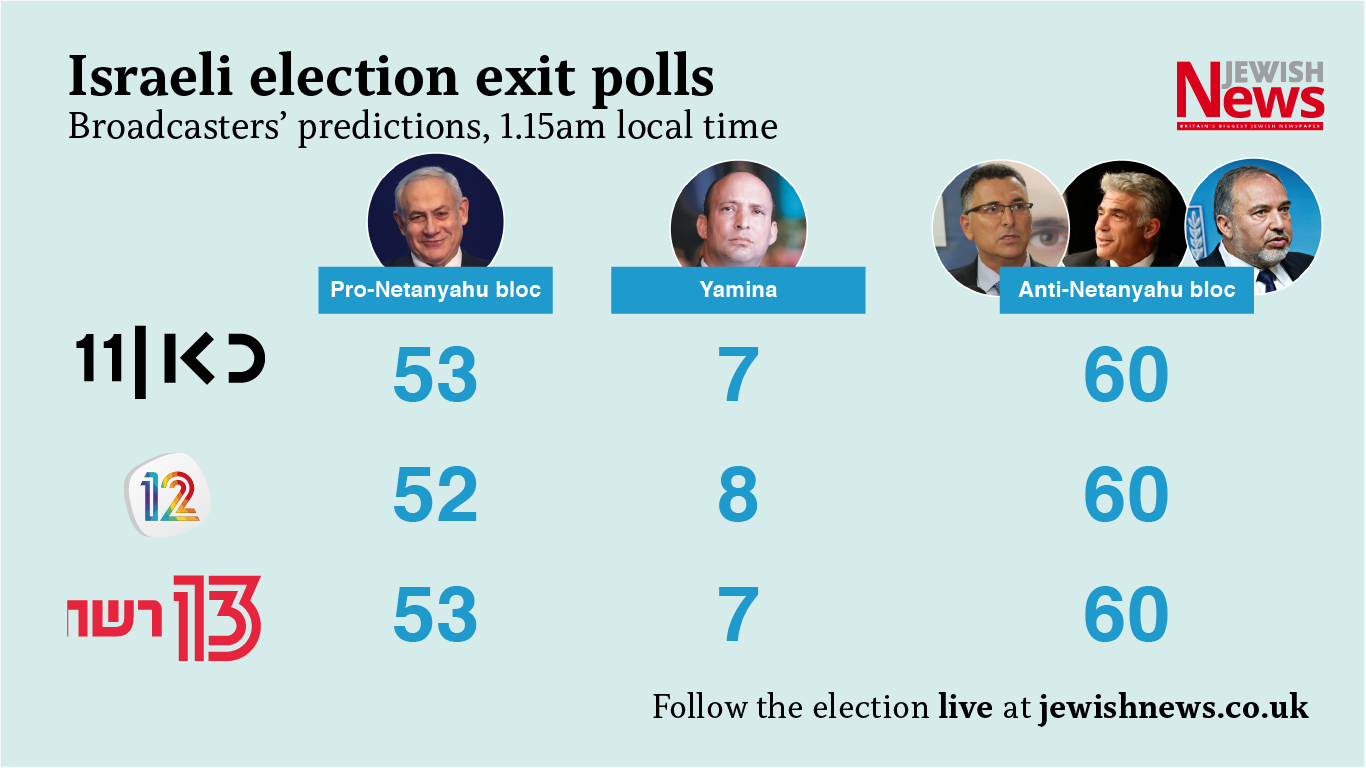 The other two broadcasters — Channel 11 and Channel 13 — have aligned themselves with the broad strokes of Channel 12’s update.
The other two broadcasters — Channel 11 and Channel 13 — have aligned themselves with the broad strokes of Channel 12’s update.
All three now predict a 60:60 deadlock between the pro- and anti-Netanyahu blocs.
There are also mutterings that Channel 12 might be set to make a new call on the United Arab List, the conservative Arab faction that was initially thought to have fallen short of the threshold.
UAL’s arrival into the game would upend many calculations.
Benny Gantz speaking
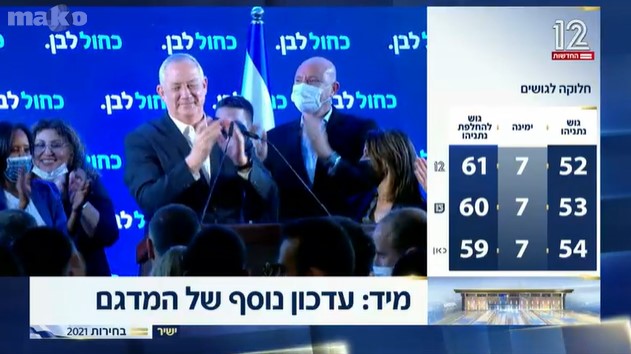 At least three times in his remarks, Gantz alluded to a fifth election. He said it was something he wanted to avoid, but that his party would “stand strong” if it happened.
At least three times in his remarks, Gantz alluded to a fifth election. He said it was something he wanted to avoid, but that his party would “stand strong” if it happened.
There’s also the small detail of his previous coalition agreement with Benjamin Netanyahu, which is still in force and would theoretically result in Gantz assuming the role of prime minister in November under the rotation agreement.
A distant prospect, yes, but after four elections in two years, so many impossibilities in Israeli politics now feel plausible.
Another unexpected outcome of this election: Benny Gantz has become the second Israeli party leader, after Betzalel Smotrich, to sing and dance to his supporters on stage.
What a strange night.
Benny Gantz speaking
 The leader of the Blue & White party, which is comfortably over the electoral threshold, beams wider than he ever did when his party nearly topped the polls in previous elections.
The leader of the Blue & White party, which is comfortably over the electoral threshold, beams wider than he ever did when his party nearly topped the polls in previous elections.
It’s the face of a relieved man.
Like other party leaders, he too speaks only in broad terms and says it’s too early to draw conclusions.
But he’s the first leader tonight to express a hope for peace with the Palestinians.
He expressed a hope that a Netanyahu government does not continue.
1am update
• Exit polls are shifting slighty, but still suggest both main blocs in Israel have a route to forming the next government of Israel
• The anti-Netanyahu bloc appears closer to a 61-seat majority, albeit narrowly
• The strictly-Orthodox and far-right parties supporting the prime minister appear not to have done well enough to deliver him a majority
• Speaking this evening, Naftali Bennett did not commit himself to either side and remains a possible kingmaker with the potential to pick either side.
• We have had careful, non-committal statements from Yair Lapid and Avigdor Lieberman
• Gideon Saar, who broke away from Likud before the election but appears set for a disappointing night, has repeated his commitment not to join a Netanyahu government
• Labour’s Merav Michaeli hailed her party’s rival after it appeared comfortably over the electoral threshold
• Turnout is markedly down on previous election
Yair Lapid speaking
 It was a notably restrained statement from the leader of Israel’s second largest party, in keeping with the restrained campaign that he ran. He did not declare victory, nor did declare the end of the Netanyahu era.
It was a notably restrained statement from the leader of Israel’s second largest party, in keeping with the restrained campaign that he ran. He did not declare victory, nor did declare the end of the Netanyahu era.
Yair Lapid speaking
 The leader of Yesh Atid describes his movement as the leader of the “change bloc”, hailing its trajectory from the fourth to the second-largest in the Knesset.
The leader of Yesh Atid describes his movement as the leader of the “change bloc”, hailing its trajectory from the fourth to the second-largest in the Knesset.
“As of this moment, there will not be formed in Israel a government formed on the racist, dark Kahanists.
“We shall do everything to set up a sane government in Israel.”
So, what now?
It’s just gone half past midnight in Israel, two-and-a-half hours since the polls closed, and we haven’t had a single result yet.
That’s normal: the votes are still being transported from the over 3,000 polling stations to counting centres for processing.
So much of the noise we’ve heard tonight is based around the excitement generated by the exit polls.
That’s why we’ve heard from a smattering of small parties — for them, the exit polls have offered the comfort of having crossed the 3.25% election threshold — but not yet from the top two leaders: Benjamin Netanyahu and Yair Lapid.
If the last three elections are anything to go by, we should hear from them tonight in the next couple of hours.
Before then, we’re expecting the other broadcasters to revise their exit polls.
Betzalel Smotrich speaking
 An excitable Bezalel Smotrich is hailing a victory for his Religious Zionist faction, which will be one of the largest far-right blocs the Knesset has ever seen.
An excitable Bezalel Smotrich is hailing a victory for his Religious Zionist faction, which will be one of the largest far-right blocs the Knesset has ever seen.
He pauses his remarks to dance on stage to what appears to be a club remix of the Shehecheyanu blessing.
It’s…unusual.
Channel 12 revises exit poll
An earlier-than expected change to the exit poll put out by Channel 12 — and it’s not in Netanyahu’s favour.
Chanel 12 predicts Shas and Yisrael Beiteinu will each win one fewer seat, while Meretz and Blue & White will each take one more. The net outcome is
60 seats for the anti-Netanyahu bloc and 53 seats for Bibi’s supporters. If this turns out to be the result, it would mean Naftali Bennett’s support is not enough for a Netanyahu government.
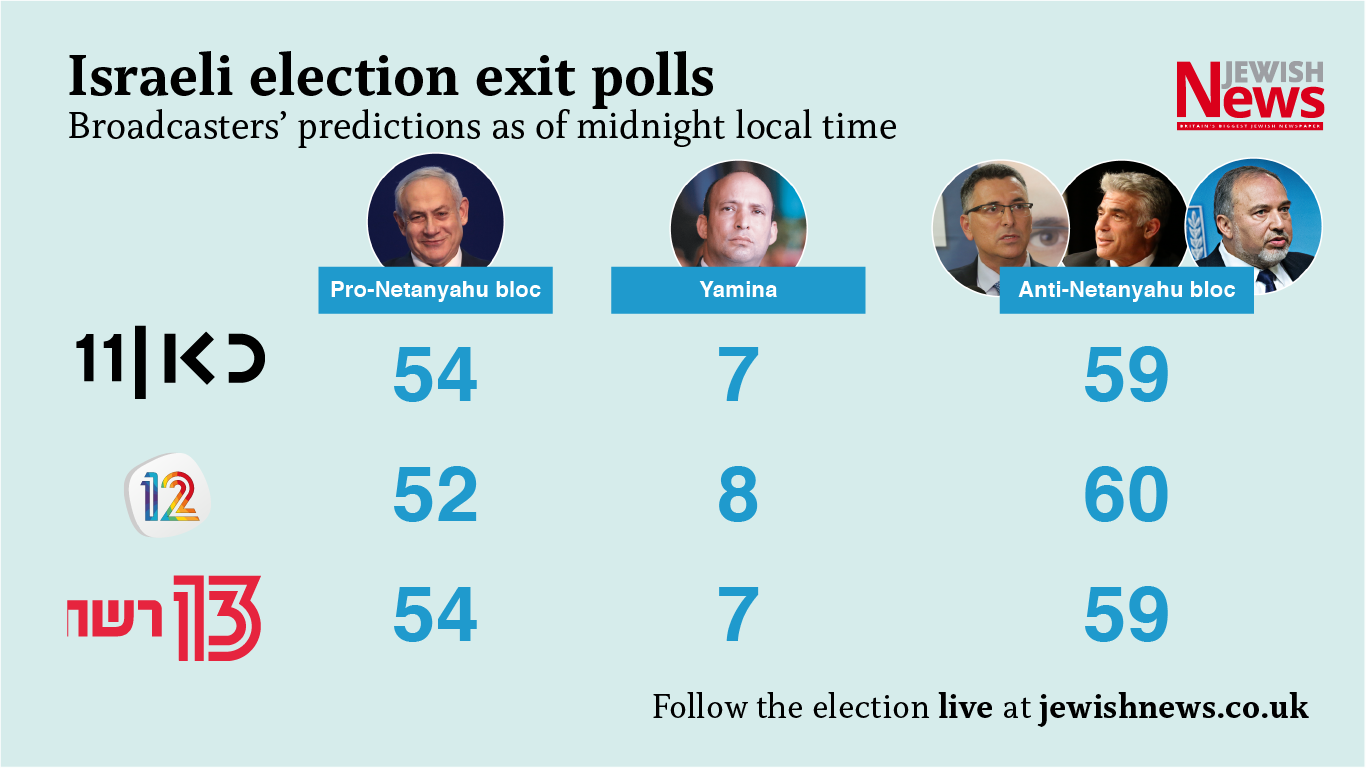
Naftali Bennett speaking
 Naftali Bennett is painting a cautious picture, not willing to commit himself to either side of the Netanyahu divide.
Naftali Bennett is painting a cautious picture, not willing to commit himself to either side of the Netanyahu divide.
He says he will wait a few days to see the full results.
“I am a right-winger,” he says and proceeds to deliver a carefully calibrated, right-wing message.
He adds, seemingly apropos to nothing, that he will defend communities in the Negev desert against “Bedouin gangs”.
Avigdor Lieberman speaking
 The Yisrael Beiteinu party leader offers a very short statement.
The Yisrael Beiteinu party leader offers a very short statement.
Israel cannot be governed as it has been so far, he says, adding that “something has to change”.
But he also says that he will be waiting a few days for the full results to become clear.
No visible movement on his anti-Netanyahu position, then, but then again Lieberman has long been one of the more cryptic of the party leaders.
Midnight update
• Exit polls suggest both main blocs in Israel have a route to forming the next government of Israel, but both are short a 61-seat majority
• The parties supporting Benjamin Netanyahu are predicted to take between 54-55 seats
• The parties opposed to him are predicted to win 59 seats
• Naftali Bennett looks set to become kingmaker with the potential to pick either side
• Gideon Saar, who broke away from Likud before the election but appears set for a disappointing night, has repeated his commitment not to join a Netanyahu government
• Labour’s Merav Michaeli hailed her party’s rival after it appeared comfortably over the electoral threshold
• Voting counting has begun since the polls closed two hours ago
• Turnout is markedly down on previous election
Gideon Saar speaking
 Saar is putting a brave face on things, suggesting his was a decent result for a new party.
Saar is putting a brave face on things, suggesting his was a decent result for a new party.
“Had New Hope not been formed, Netanyahu would have 65 seats, maybe more.”
He repeats his commitment not to join a Netanyahu-led government.
Gideon Saar emerges
We’re getting quite a trickle of party leaders appearing for a spot of airtime now. Now Gideon Saar, whose New Hope party has dashed early expectations. He’s just arrived at his election party.

First word from Netanyahu
Benjamin Netanyahu has claimed victory in a series of tweets in which he says the majority of Israelis have demonstrated they are right-wing.
אזרחי ישראל – תודה! הענקתם ניצחון ענק לימין ולליכוד בהנהגתי. הליכוד גדול בפער עצום מול המפלגה הבאה בגודלה – אנחנו בקידומת 3 והבאים בקידומת 1 >>
— Benjamin Netanyahu (@netanyahu) March 23, 2021
The truth is that a new government led by him is quite a while off yet.
Channel 12 exit poll
 We’re expecting the exit polls to change as the night wears on but Channel 12 seem to be predicting that theirs could be revised fairly soon to 60:60 for the two camps, an even split.
We’re expecting the exit polls to change as the night wears on but Channel 12 seem to be predicting that theirs could be revised fairly soon to 60:60 for the two camps, an even split.
We’ll wait and see.
Labour’s Merav Michaeli speaking
 “They managed to murder Yitzhak Rabin, but they will never manage to murder his path.”
“They managed to murder Yitzhak Rabin, but they will never manage to murder his path.”
Labour’s Merav Michaeli speaking

There’s jubilation at Labour HQ, where Merav Michaeli has scraped her party off the floor and delivered it safely over the electoral threshold.
It appears to have been a better night than expected for Israel’s founding party, which is predicted to take around seven seats.
“Labour is back,” she says with a smile. “This is just the beginning.”
VIDEO: Exit poll snap analysis
Nathan and I had a quick chat about the exit poll results and what they mean for the next Israeli government, Naftali Bennett and the smaller parties. Watch below.
Shas leader speaking
 Aryeh Deri thanks God for delivering the result.
Aryeh Deri thanks God for delivering the result.
He says he has had a “long conversation” with the prime minister and adds: “And shortly we will form a Jewish government, a nationalst, traditionalist government that will preserve the Jewish state of Israel.”
He calls on the leaders of Israel’s other right-wing parties to join them: he namechecks Moshe Gafni and Yaakov Litzman of United Torah Judaism, Bezalal Smotrich of the Religious Zionist faction and Naftali Bennett.
Celebrations at Shas HQ
 Large-scale celebrations and prayers are underway by supporters of the Shas, the Sephardic strictly-Orthodox party.
Large-scale celebrations and prayers are underway by supporters of the Shas, the Sephardic strictly-Orthodox party.
They’ve had a good night so far, with predictions of possibly an additional seat that could make them the third-largest faction in the Knesset.
11pm update
- Exit polls suggest both the pro- and anti-Netanyahu blocs have a route to forming the next government of Israel, but both are short a 61-seat majority
- The parties supporting Benjamin Netanyahu are predicted to take between 54-55 seats
- The parties opposed to him are predicted to win 59 seats
- Naftali Bennett’s Yamina looks set to become the kingmaker with the potential to pick either side
- Voting counting has begun since the polls closed an hour ago
- Turnout is markedly down on previous elections
The kingmaker speaks
This from the Jerusalem Post’s Lahov Harkov:
Bennett on his kingmaker status: “I will only do what is good for the State of Israel.”
— Lahav Harkov (@LahavHarkov) March 23, 2021
The route for Netanyahu
This graphic from Channel 11 makes clear how much of a kingmaker Naftali Bennett could be. The seven seats he is predicted to take could land him in either camp.

Of course, no actual votes have been counted yet.
The scene at Likud HQ
Channel 13’s live shot of the reaction to the exit poll shows an empty stage, podium and auditorium. They must all be in the back, counting their chickens.

Exit poll takeaways
- Likud predicted to win between 31-33 seats
- Yesh Atid placed between 16-18
- Labour, Meretz and Blue & White all surpass expectations, each predicted to take between 6 and 8 seats apiece
- The United Arab List is predicted to fall short of the electoral threshold.
- The other Arab faction, the Joint List, is expected to take 8-9 seats
Remember that 61 seats are needed for a majority. With all broadcasters predicting 59 seats for the opposition bloc, Naftali Bennett’s Yamina becomes a true kingmaker on these figures.
But remember that it’s only an exit poll and no broadcaster has ever predicted the outcome precisely correct.
What the voters say: why I voted Labour
Angela Godfrey-Goldstein voted Labour in the hope of averting what she considers the “burgeoning neo-fascism” of three of the leading parties.
Godfrey-Goldstein, a well-known British voice among Israel’s left-wing activists, used this phrase to describe Likud, its opponent New Hope, and the rightist Yamina.
In the last election, she cast her vote for Joint List, the mainly Arab party, but opted for Labour this time, as if there is a non-Bibi government, she wants it to have a left-wing contingency, which she thinks is best achieved with a strong Labour.
In her view Labour leader Merav Michaeli is “finally a politician whom I trust, who has truth at the centre of her political philosophy, and who is not cynical or corrupt, a liar, fraud and on trial.”
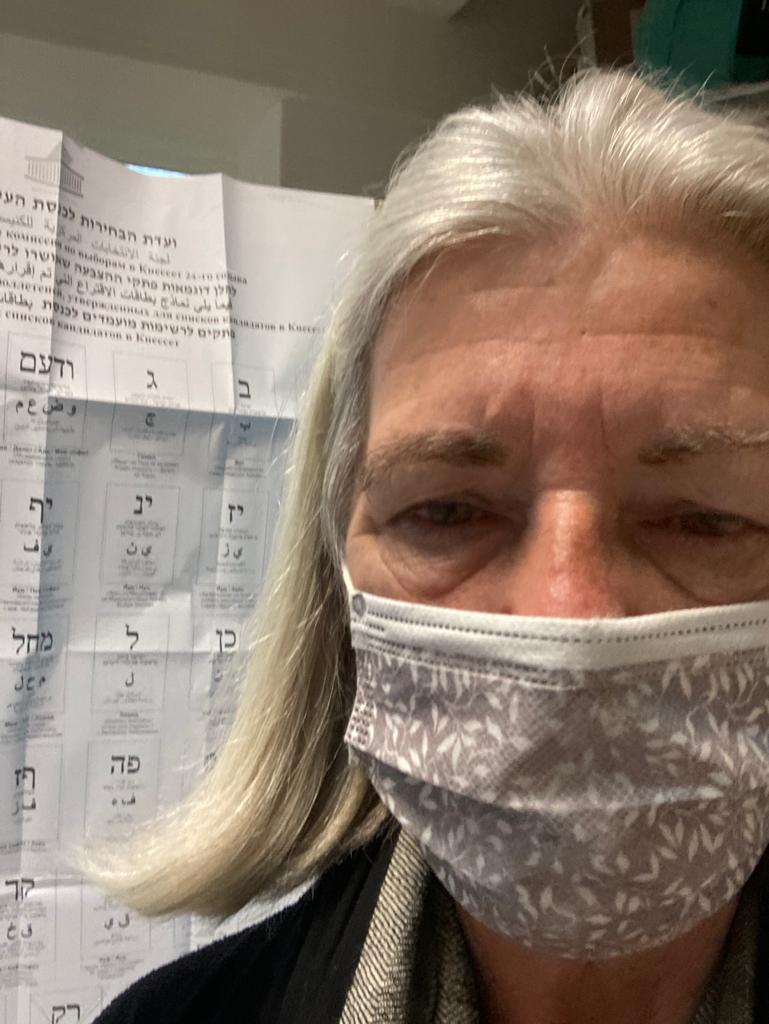
She is “a way more decent human being than most of the rest of the pack,” and could represent “a vote for sanity in coalition building.”
She wants to see Michaeli enter the government, build her credentials, and one day lead Israel. Godfrey-Goldstein said: “I don’t think she will gain a cabinet position this time around, but oh golly gosh, I’d love to see her as Prime Minister one day.”
What voters say: the Israeli Arabs backing Netanyahu
Prime Minister Benjamin Netanyahu has been trying to woo Arab voters, but wasn’t this destined to fall flat given his clashes with the sector in the past? Not necessarily, some say.
Hamudi Amash, a 26-year-old Jisr az-Zarqa, said he is voting for Netanyahu’s Likud.
He insisted that Arab society is misunderstood, and while some are very antagonistic to the PM, others have lots of time for him.
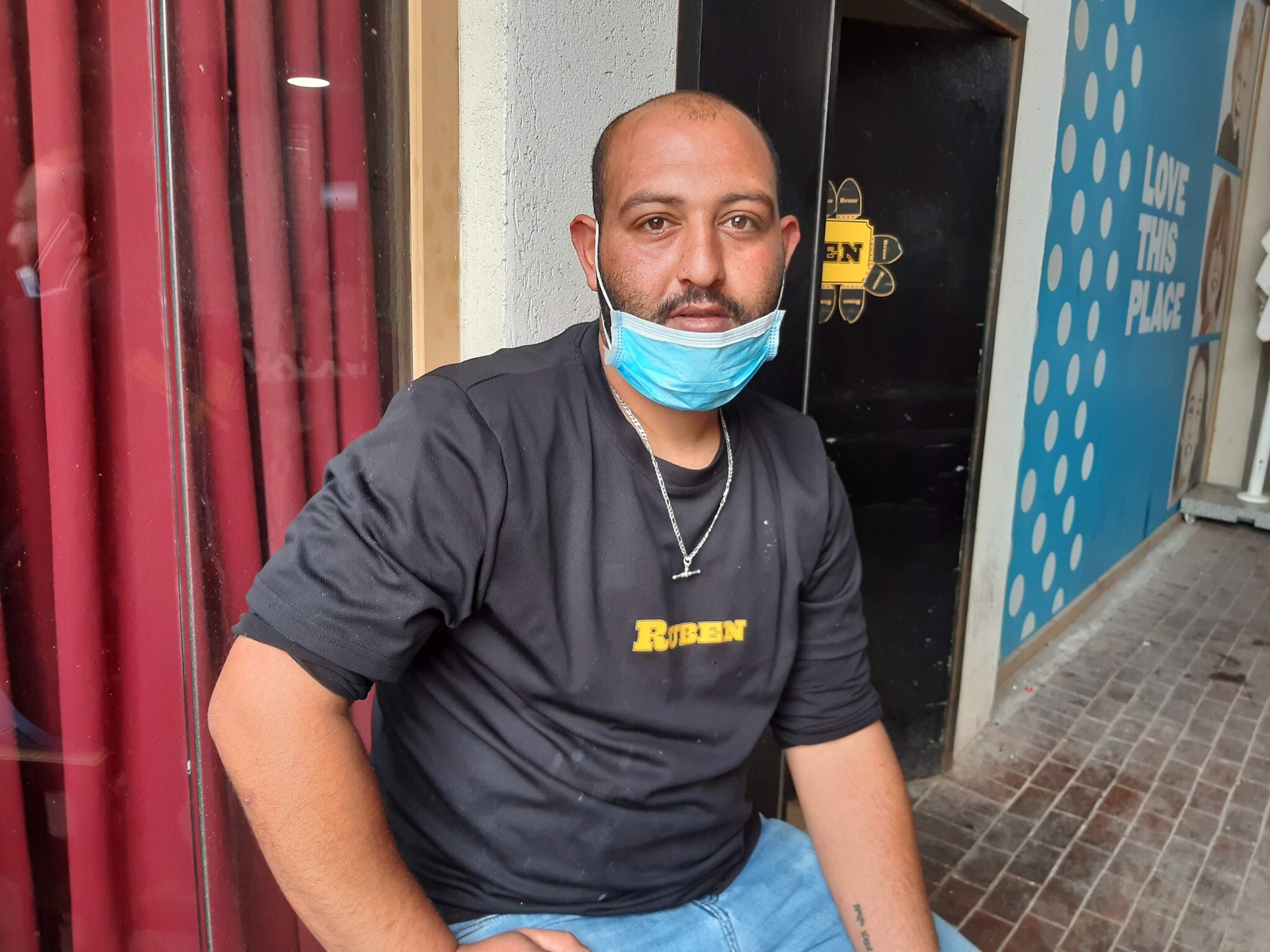
“He’s a good man and I’m used to Israel led by him,” said Amash, who was in his mid teens when Netanyahu entered office.
He said that Netanyahu is liked in his town, which is close to near Ceaserea where Netanyahu has his private home. “He’s our neighbour, we like him.”
Several Arab citizens reported, with varying degrees of enthusiasm, that they are voting for the mainly-Arab Joint List party, and some said they are backing left-wing Jewish parties.
But 27-year-old Emad Masri was thoroughly disillusioned, and said: “I don’t know if I’ll vote, it feels like a waste of time,” he said. “I’m Arab and I’m expected to vote for the Arab party [Joint List], but I feel that the politicians just want to get their seats. I don’t know if I’ll end up voting.”
What voters say: left-wing parties ‘have lost all connection to Judaism’
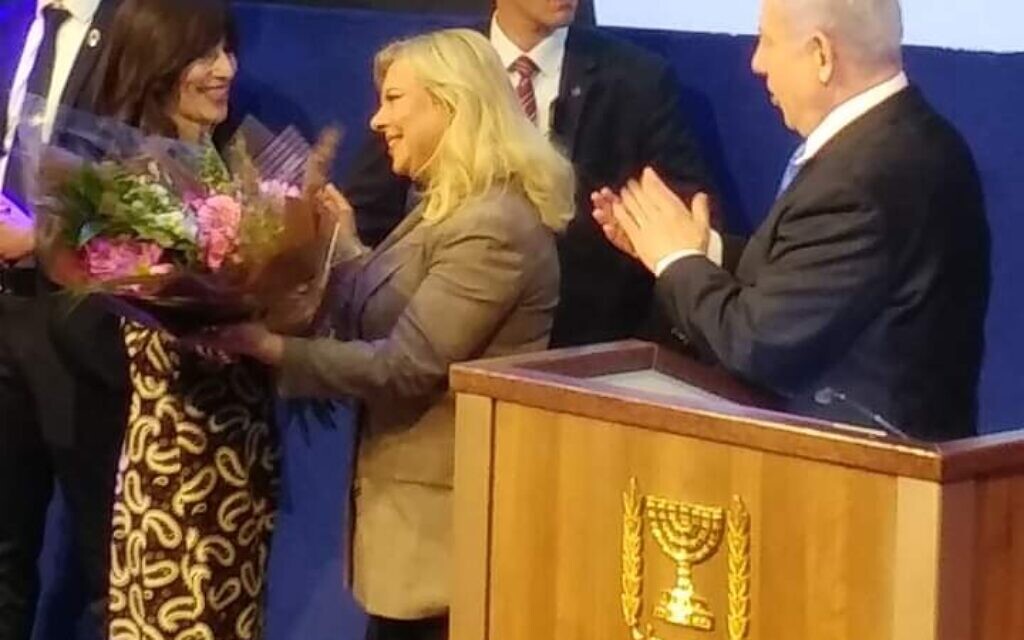
Nicole Monk, British olah and Likud party activist, thinks that the left-wing parties Merez and Labour “have lost all connection to Judaism and pride in Israel” and constitute “the biggest dangers to Israel and family life.”
Soon after casting her vote on Tuesday she said: “I can’t imagine how they would defend Israel in the Hague, or against Iran’s nuclear weapons. It’s frightening to think what would happen if we didn’t have a strong capable leader like Netanyahu fighting our corner.”
Monk, a 54-year-old Netanya-based teacher, presented Netanyahu and his wife Sara with flowers at a party rally last year, and speaks of the PM in glowing terms.
“He has the experience, stamina and qualities of a highly respected statesman and leader,” she said.
“He made four recent peace agreements, with four more on the way. Millions of vaccines were brought to Israel by his own determination and obsession. We are world leaders in the vaccine output and other, bigger countries are still fighting over which type and how.
“Netanyahu is determined to get all our citizens vaccinated and return our lives to normal. He is a leader with great vision, advancing the safety and security of us all, and standing up to Israel in both the hostile United Nations and in the White House. No other party leader comes close to his accomplishments.”
What voters say: ‘Yesh Atid, because it’s time for change’
Lisa Oren is convinced that Yesh Atid offers Israel the chance of “honest, principled, rational and liberal government.”
A Glaswegian who moved to Israel in 1993 and works for a philanthropic foundation, she cast her vote for the centrist party because “it’s time for change and I believe Yair Lapid is the man who can bring it about.”

She added: “Yesh Atid is also passionate about women’s rights protecting children and battered women, and fighting for the rights of the disabled.”
One hour to go until the exit polls
The polls will close in one hour, at which point Israel’s main broadcasters will put out their exit polls.
For those more familiar with the exit poll after British elections, which tends to be a collaboration between the BBC, ITV and Sky, you’re in for an unsettling moment.
In Israel, the broadcasters do their own exit polls and they can differ wildly from each other — and from the results.
We’ll have all three exit polls here so we can all start chewing over the numbers.
Turnout heading for a record low
The early story of this election appears to be that Israelis are voting in fewer numbers than they have at any time for many years.
As of 4pm Israeli time today, 42.3% of the electorate had voted. That’s lower than the 42.8% who had voted by this time in April 2019.
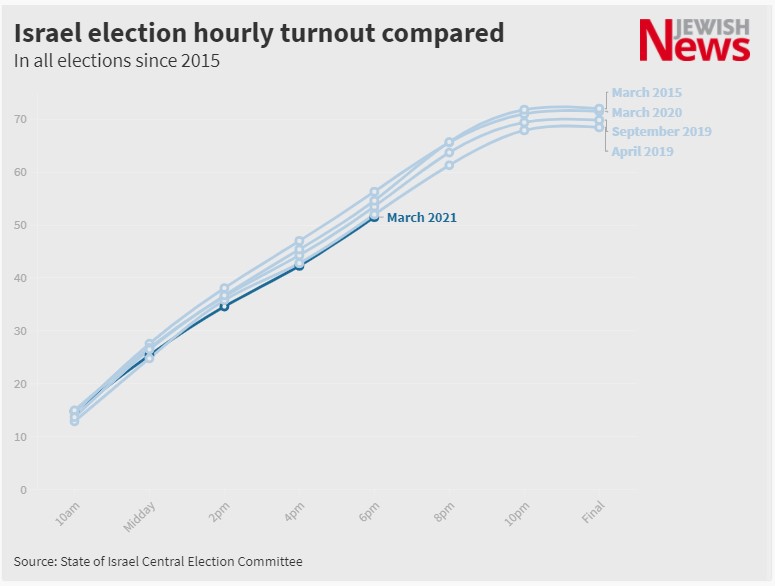
The people are shopping, not voting
Turnout at polling stations is the lowest it has been in a decade, but turnout at malls is huge, and Israelis are even prepared to engage in that dreaded activity — queueing — in order to get in.
It’s a national holiday and people have flocked to the shops.
And while vaccinations mean the country is moving back to normality, laws still limit capacity in shops.

So at fashion stores like Zara, shown here, lines are mounting outside, and one shopper is being allowed access as one leaves.
The Jewish supremacist candidate

The far-right politician Itamar Ben Gvir, admirer of the late racist rabbi Meir Kahane, is running a blunt campaign.
“Ben Gvir: the most right wing there is,” say his posters, which have been hung at many junctions around Israel’s roads.
He looks almost certain to win a Knesset seat, as he is number three on the list of the Religious Zionist party, which is expected to win four or five seats.
The rallying calls appear
With a little over three hours to go until the polls close, the party leaders are issuing rallying calls on social media to urge people to the polls.
They all have one thing in common: a tone of desperation. “Your party, the one you love, will fall victim to its hated opponent/the electoral threshold (delete as appropriate) if you do not vote now.”
Here’s Defence Minister Benny Gantz, whose party Blue & White could fall foul of that 3.25% barrier, being uncharacteristically impassioned on Twitter.
הפייק ניוז המלוכלך של יש עתיד מסכן את עתיד המחנה – חייבים להצביע ״כן״! pic.twitter.com/RxcHZHv6zT
— בני גנץ – Benny Gantz (@gantzbe) March 23, 2021
The master of the trade, however, is Benjamin Netanyahu, who used a clip filmed in a car journey between one of his campaign stops in Jerusalem to warn of ills of Yair Lapid.
ירושלמים — צאו להצביע מחל! pic.twitter.com/myTEN0IZtZ
— Benjamin Netanyahu (@netanyahu) March 23, 2021
Bibi at the beach
Benjamin Netanyahu, meanwhile, was driving out the vote by the beach under some pretty stormy skies — with a heavy security detail.
Netanyahu, today#israelelections pic.twitter.com/gc0fJFhv5p
— Amichai Stein (@AmichaiStein1) March 23, 2021
Bennett and Smotrich cross paths in Giv’at Shmuel
With party leaders energetically campaigning in their strongholds in an effort to drive out the vote, it was inevitable some would cross paths.
סמוטריץ׳ יהיה לדעתי הפתעת הבחירות. בנט לא נראה נלהב כמוהו מהמפגש הספונטני בגבעת שמואל. ותראו את השטח של זה לעומת זה… pic.twitter.com/mB56aofCps
— Ariel Kahana אריאל כהנא (@arik3000) March 23, 2021
This encounter in the central neighbourhood of Giv’at Shmuel, east of Tel Aviv, was between the Religious Zionists’ top candidate Bezalel Smotrich and Naftali Bennett, from Yamina.
Smotrich is a sure bet to back Benjamin Netanyahu in a future government, whereas Bennett has been more coy — although many believe he too will return to Bibi’s camp.
Two right-wing leaders who will find one another around the same cabinet table before long?
Heavy pollution discouraging voters?
I wrote earlier this morning about the weather in Israel being overcast but fairly warm.
It turns out things are a little more serious than that: journalist Noga Tarnopolsky reports that voter turnout is extremely low in the Negev desert communities because of dense sand in the air.
A sandstorm has blanketed Israel today. @KhJacki reports that the heat & heavy sand in the air is only making it harder for people to go vote. In the Negev, despite get-out-the-vote efforts even in unrecognized villages turnout is extremely low, under 15%. pic.twitter.com/nYIj7MRR01
— Noga Tarnopolsky (@NTarnopolsky) March 23, 2021
She adds: “the Environment Ministry announces that air pollution is between 15% – 20% higher than average,”
What voters say: ‘Time to freshen things up. I voted for Lapid’
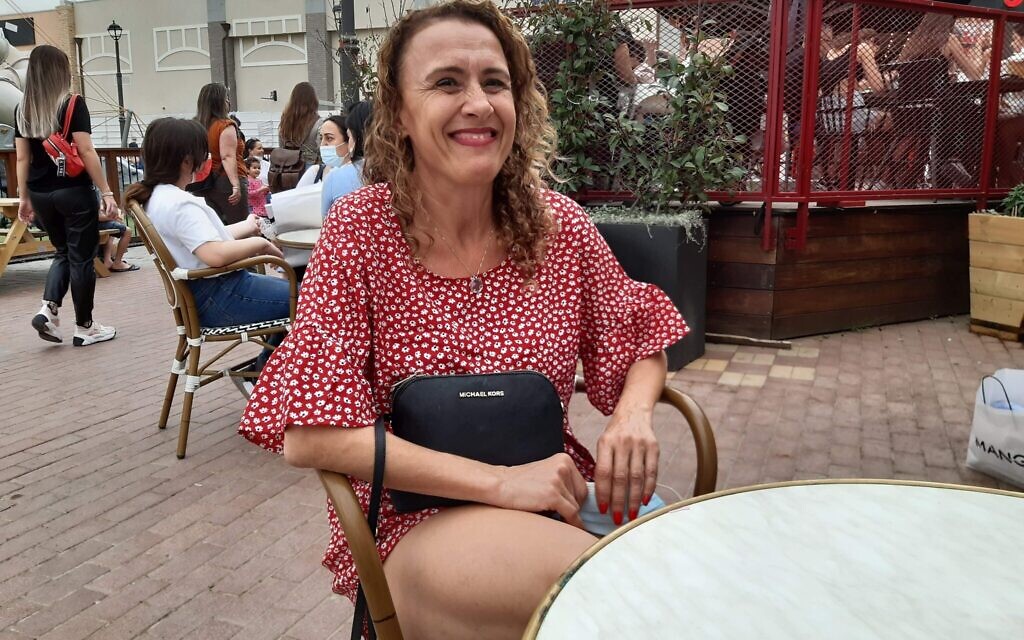
Benjamin Netanyahu’s fate lies, to a large extent, in the hands of people who have voted for him in the past and are feeling let down.
If his opponents can capture their ballots, Likud will suffer — and various voices on the streets suggests the anti-Bibi camp is having some success.
Adi Biton, 52, is “really a Likudnik but can’t vote for Netanyahu.”
She is choosing Yair Lapid’s Yesh Atid party instead.
She said: “I voted for Yair Lapid, though I’m not sure I have faith in him. But it’s time to freshen things up. I weighed up the other options and really couldn’t vote for any of them.”
What voters say: ‘I voted for Bibi because there’s no-one better’
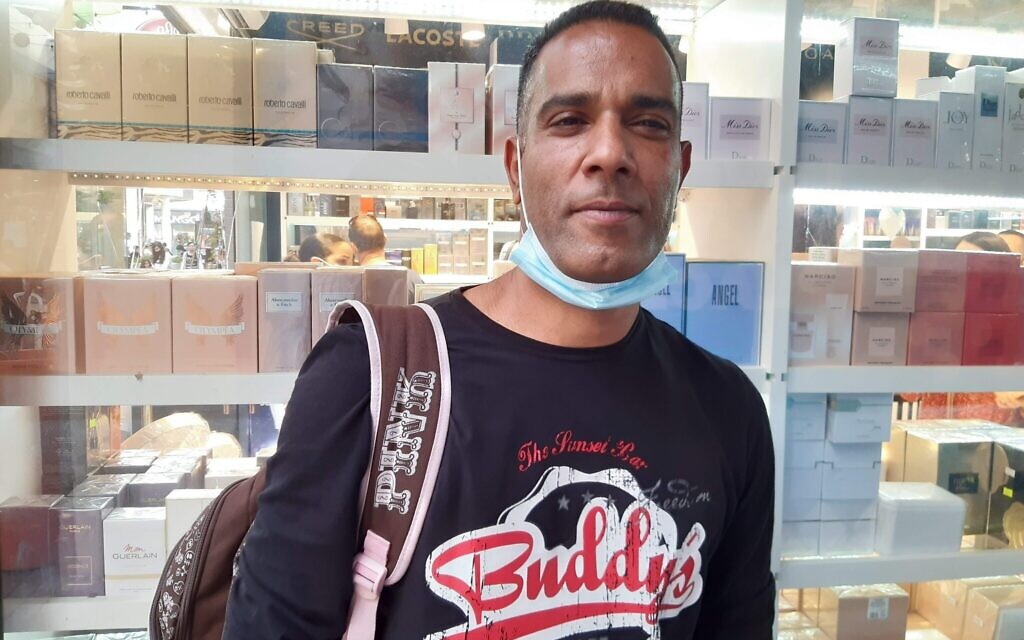
Benjamin Netanyahu is in the midst of corruption proceedings, but many of his voters insist this is irrelevant to the election.
“It’s not connected, one thing to the other,” Gadi Mavgauker, 45, of Yokneam Illit, insisted to me this morning.
“If he’s proved guilty he’ll get what’s coming to him, but if not, he should be Prime Minister.”
Mavgauker said he decided to vote for Netanyahu because, “for the last 12 years, since he was elected, things have been good here.”
He commented: “I’ve voted for Bibi because he’s the most appropriate candidate and there’s no one better. People say he’s on the right but I think he’s really more in the centre.”
Voter turnout at lowest level this decade
Israel’s election authorities keep a track of voter turnout throughout the day and the figures so far suggest the country is on track for its lowest level of voter interest in over a decade.
The last time turnout was this low was in the 2009 election — which saw Benjamin Netanyahu returned to office for what became his second term.
Runners and Riders: Moshe Gavni and Bezalel Smotrich
United Torah Judaism
Leader: Moshe Gavni
Polling prediction: 7 seats
UTJ is the Askhenazi ultra-Orthodox party and, like Shas, seems certain to support Benjamin Netanyahu’s candidacy for prime minister after the election.
Religious Zionist
Leader: Bezalel Smotrich

Polling prediction: 5 seats
This far-right alliance is new, although its components are not. The nationalist Bezalel Smotrich ran as part of Yamina in previous elections; this time, he has joined forces with the Jewish Power party. Otzma Yehudit, to use its Hebrew name, is the movement of the late Rabbi Meir Kahane’s followers — which, its detractors say, makes it a racist, Jewish supremacist party. It seems likely to win seats for the first time.
Runners and Riders: Aymen Odeh and Mansour Abbas
Joint List
Leader: Aymen Odeh
Polling prediction: 8 seats
Israel’s four main Arab parties represent a diverse spectrum that includes secular voters, Arab nationalists and Islamists, but they discovered in 2015 that they can become one of the biggest electoral forces in the country when they run together. Agreement between the rival camps is never easy, though: this year Hadash, Taal and Balad are running together but the fourth, the United Arab List, is going it alone.
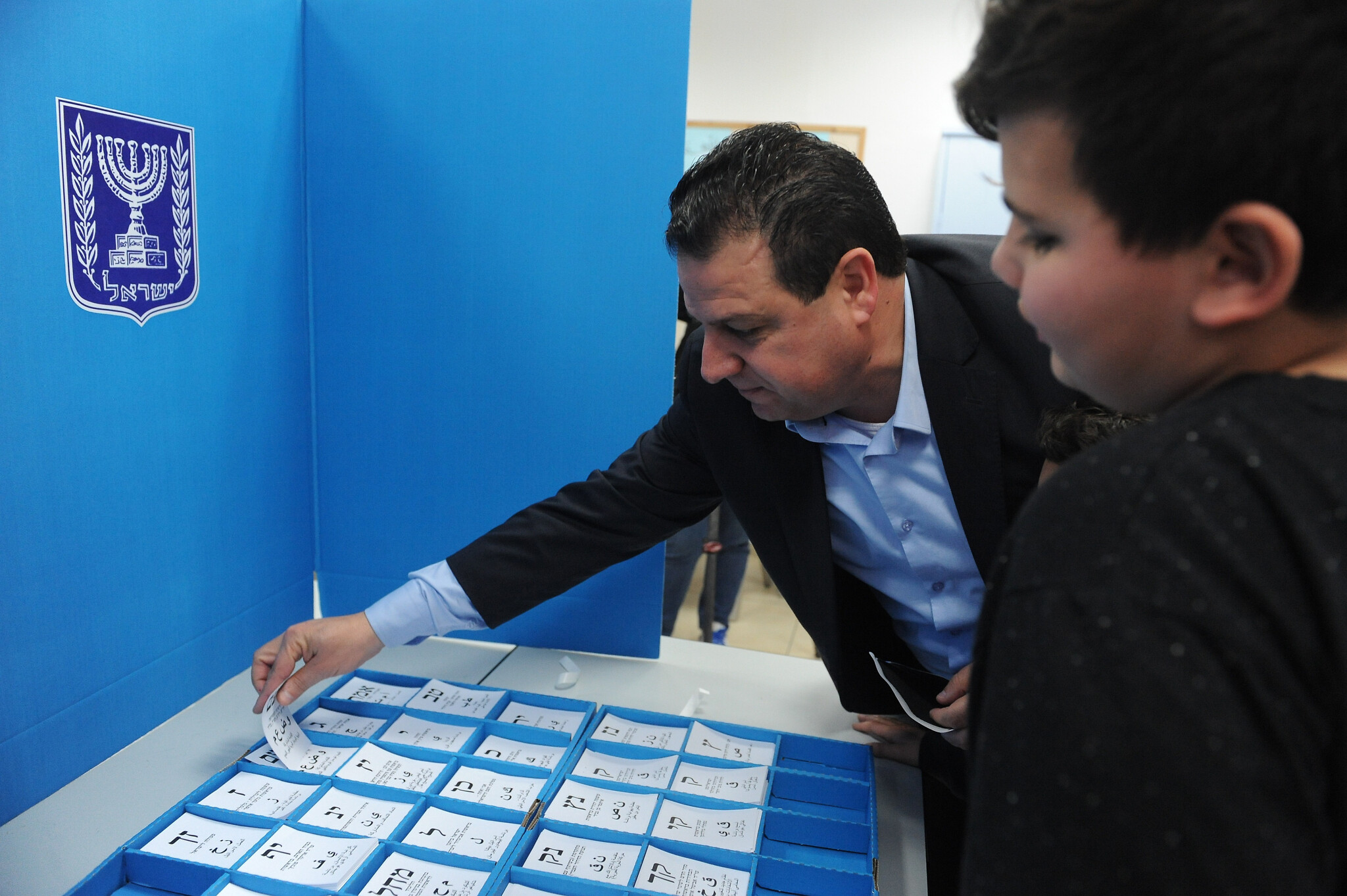
United Arab List
Leader: Mansour Abbas
Polling prediction: 4 seats
Known in Israel by its Hebrew acronym Raam, this conservative Arab party is running alone because of policy differences with the other three parties that make up the Joint List. There’s a very real risk that it will not win enough votes to cross the electoral threshold.
Runners and Riders: Yair Lapid, Michaeli, Horowitz, Gantz
Yesh Atid
Leader: Yair Lapid
Polling prediction: 20 seats
Led by a one-time TV host, this party is one of the few centrist movements that has outlasted a single election cycle in Israel’s often brutal political scene.
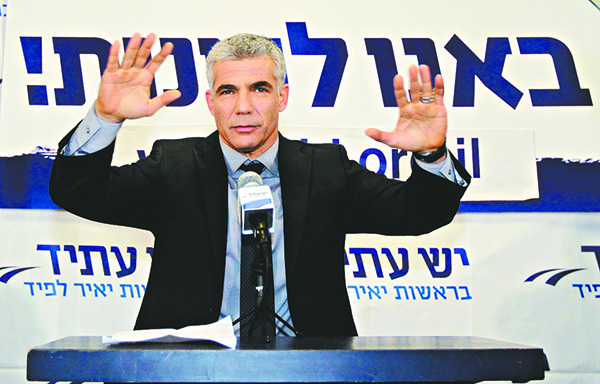
Yesh Atid owes its survival in no small part to the fact it has not stood alone in an election for six years: since then, it was part of the Blue & White alliance. But that arrangement disintegrated with Benny Gantz’s decision to join a Netanyahu government. Yair Lapid is often portrayed by the Israeli right as a left-wing figure of hate, but he’s on course to become the main opposition leader at least. He may even be back in government.
Labour
Leader: Merav Michaeli
Polling prediction: 6 seats
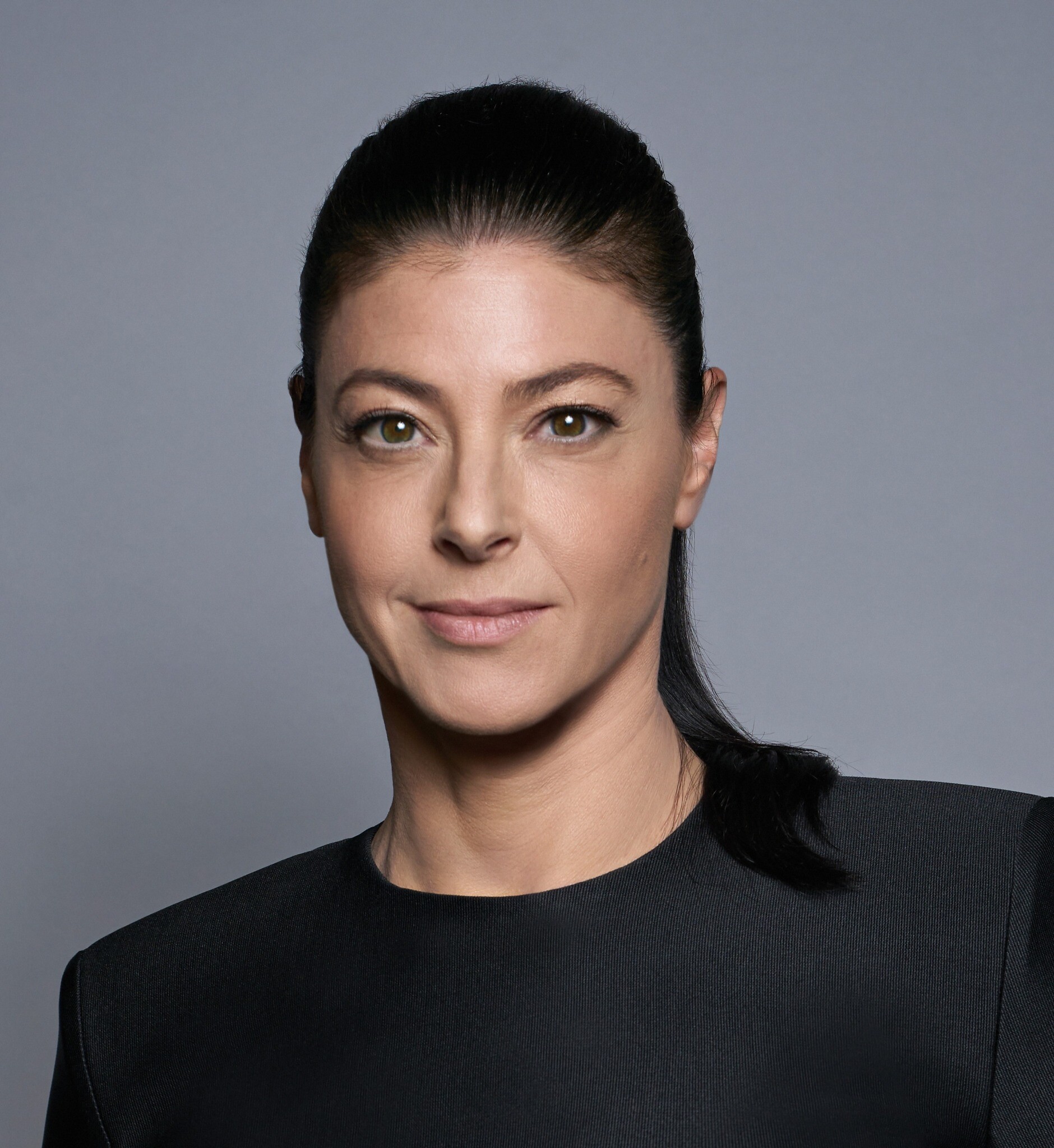
The once-mighty party that founded Israel is now a minnow. It has not won an election since 1999 and elected so few MKs in recent years that they could share an UberXL on the ride to the Knesset. The new leader, its third in as many years, is Merav Michaeli, who has likely done enough to avoid the catastrophic fate of winning no seats at all. But a long, uphill struggle awaits.
Meretz
Leader: Nitzan Horowitz
Polling prediction: 4 seats
The closest thing Israel has to a mainstream Green movement, Meretz is the furthest to the left of all the parties in the Knesset. It is far away from the heady heights of the early 1990s, when it boasted 12 seats; these days, some fear it won’t win enough votes to enter the Knesset at all.
Blue & White
Leader: Benny Gantz
Polling prediction: 4 seats
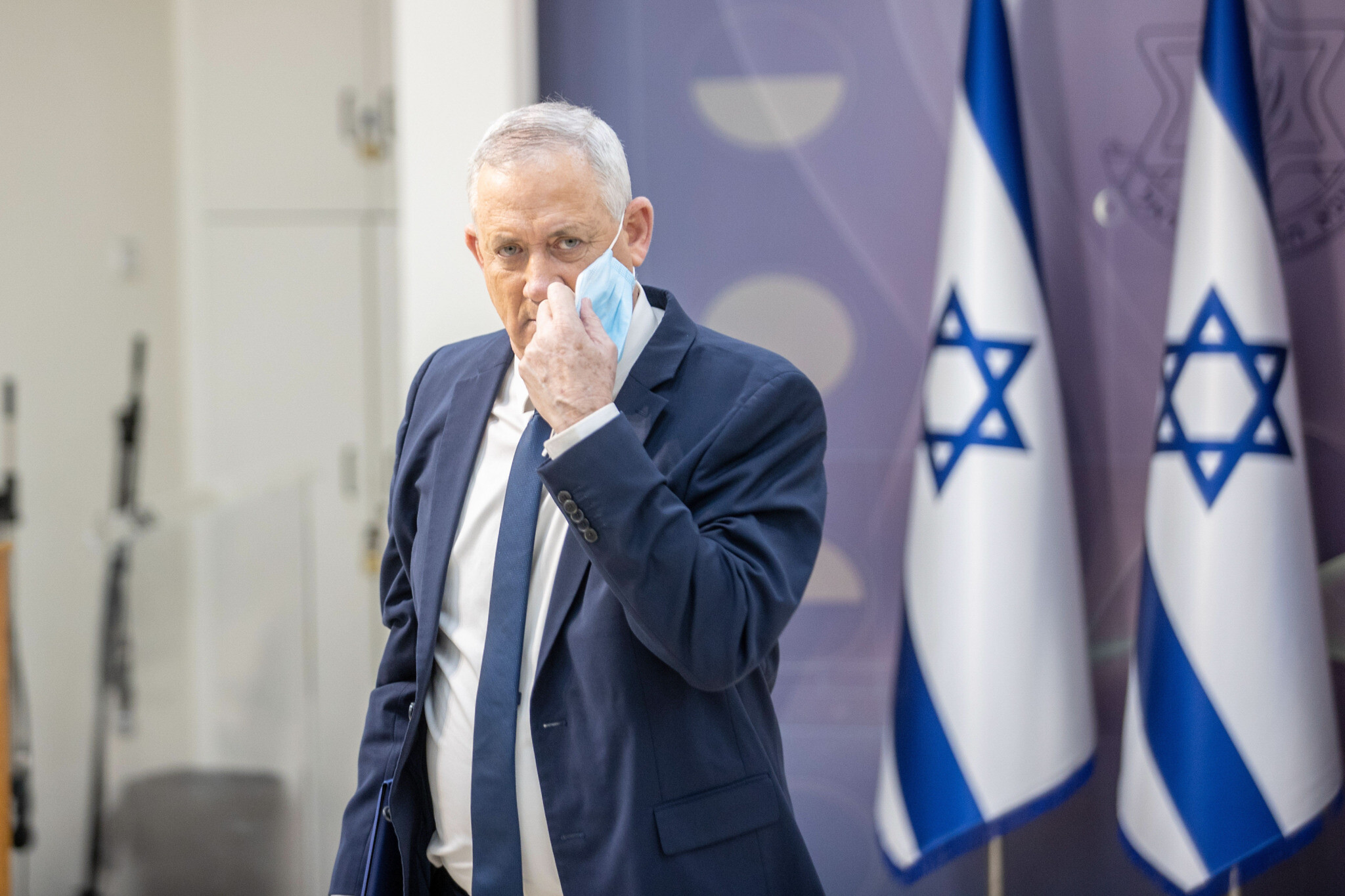
Breaking campaign promises does matter: Benny Gantz is living embodiment of that. The former IDF chief’s decision to join Benjamin Netanyahu in government did make him defence minister, but it irretrievably tore apart his alliance with Yair Lapid. It means that while Lapid’s supporters are heralding him as a candidate for prime minister, Gantz’s party might not win enough votes to enter the Knesset at all. A crashing finale for a movement that once vowed to end the era of Netanyahu.
Runners and Riders: Netanyahu, Saar, Deri, Bennett, Lieberman
Likud
Leader: Benjamin Netanyahu
Polling prediction: 29 seats
The modern mainstay of Israeli politics, Likud is almost certain to top the polls again. It would be the sixth successive election in which it won more seats than any other party. Together with the strictly-Orthodox parties and perhaps a small number of far-right MKs, it will most likely lead the largest bloc in the next Knesset. But that does not automatically mean victory: it will be Benjamin Netanyahu’s ability to divide his opponents, rather than marshal his supporters, that will determine whether he remains prime minister. His many years in power have shown he can create opportunities out of any situation.
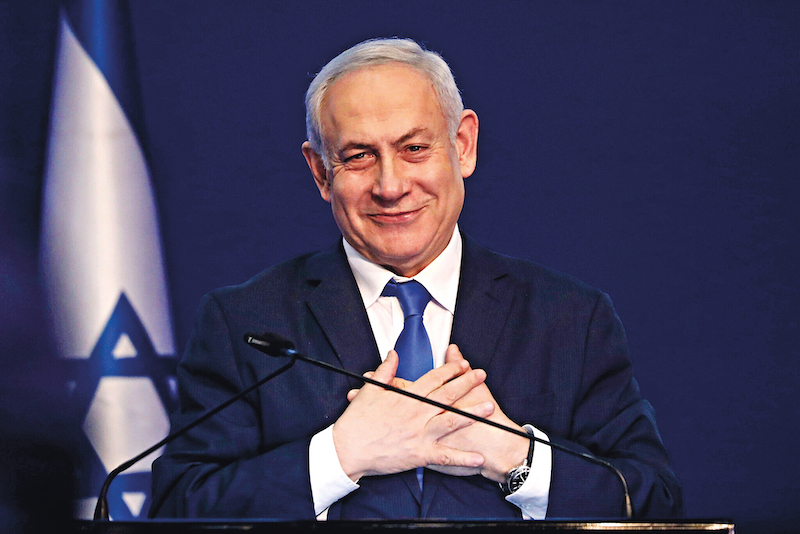
New Hope
Leader: Gideon Saar
Polling prediction: 9 seats
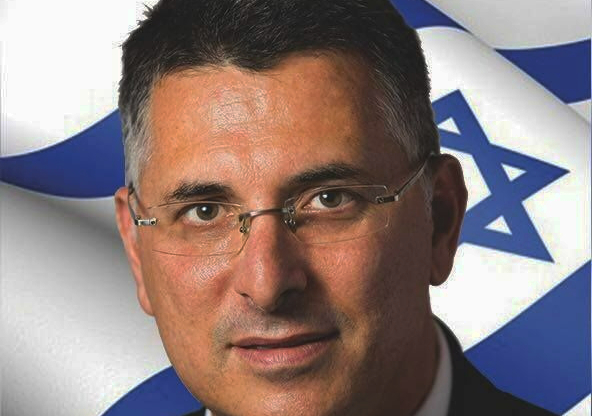
A new entrant on Israel’s political scene, this party by disgruntled former Likud star Gideon Saar and his associates was founded barely three months ago. As with Yamina’s Naftali Bennett, Saar has hopes of being a unifying force for the Israeli centre-right after – or if – Netanyahu’s reign comes to an end. Several other big Likud names defected along with Saar, who has ruled out a post-election deal with Netanyahu. But he wouldn’t be the first Israeli politician to go back on his word.
Shas
Leader: Arye Deri
Polling prediction: 6 seats
Shas is the Sephardic one of Israel’s two strictly-Orthdox parties and a longstanding partner of Benjamin Netanyahu. Although it has sat in government under Labour in the past, it’s a sure bet to back Likud this time.
Yamina
Leader: Naftali Bennett
Polling prediction: 11 seats
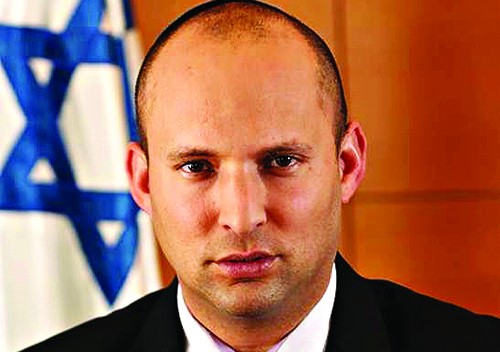
Bennett’s Yamina is largely run as a co-leadership with Ayelet Shaked: the two have between them have held some of the biggest ministries in the cabinet, including education, justice and defence. In terms of ambition, though, Bennett stomps on similar ground to Gideon Saar’s New Hope. Both parties are angling to lead the Israeli centre-right after Netanyahu. But Yamina is much less moderate and has flirted with more extremist end of conservative Israeli politics in recent years. Few believe Bennett’s claims that he won’t sit in a Netanyahu government either.
Yisrael Beiteinu
Leader: Avigdor Lieberman
Polling prediction: 7 seats

Another right-wing movement led by another former Netanyahu ally, Yisrael Beiteinu largely courts immigrants from the former Soviet Union. But Avigdor Lieberman was pivotal in preventing an automatic victory for the Israeli prime minister after the two elections of 2019 and hasn’t shifted tack ahead of this election either. His longstanding vow not to sit in government with the strictly-Orthodox parties complicates the post-election arithmetic.
Brit in Israel: ‘Election Day is always a great atmosphere!’
Michael Dickson, Executive Director of pro-Israel group StandWithUs, moved to Israel 15 years ago from London. He said in that time:
“It’s our 7th election – 4 of them being in the last 2 years! Election Day is always a great atmosphere – and pretty unique, the only public holiday with no religious symbolism at all. And with the success of the vaccination drive, people are out and about enjoy national parks, shopping and spending time with friends.”

Brit in Israel: ‘An honour, privilege, blessing and onerous responsibility’
James Gould, moved to Israel eight-and-a-half years ago from Newcastle. He now lives in Ra’anana, and said:
“It is an honour, a privilege, a blessing and an onerous responsibility, onerous because we are having our say in our country’s future, onerous because we are foisting our vote on the country and our achim and achot, onerous because it really matters! I made Aliyah 8.5 years ago and I’ll never take for granted the privilege, I’ll never take my responsibility lightly.”

Brit in Israel: ‘Sick and tired of all of this madness!’
Vicki Gotlieb, originally from London, moved to Israel 31-years ago. She told Jewish News:
“I will be voting for Yair for the 3rd time. Sick and tired of all of this madness. It really looks like we are going to end up with a civil war in the end. So so so sad.”
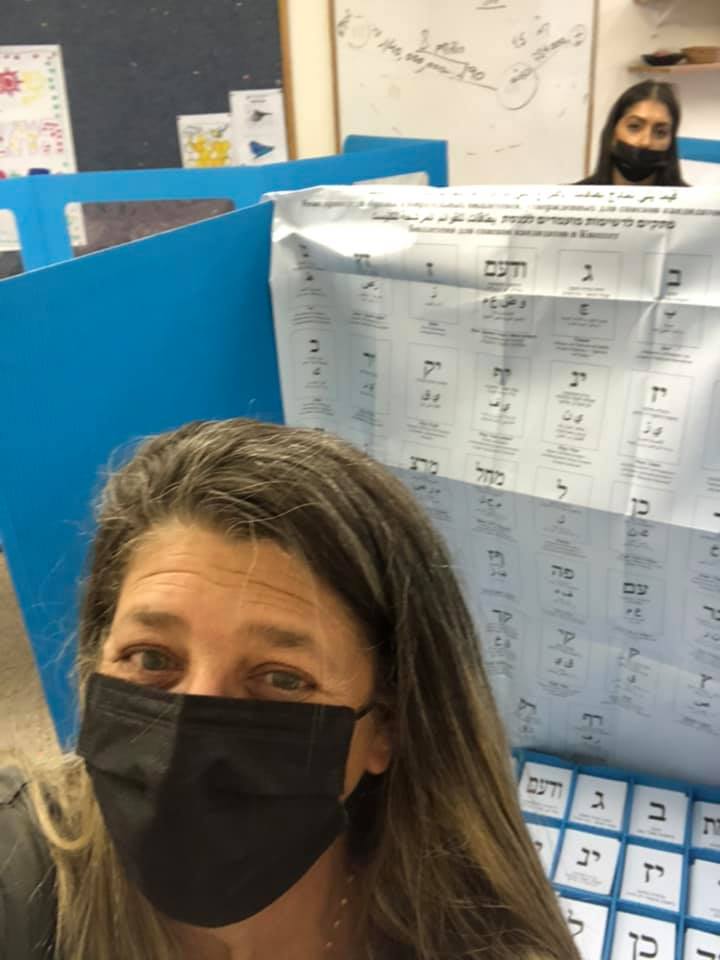
Brit in Israel: ‘My fourth election in four years since making Aliyah’
Andrea Samuels, who moved to Israel from Manchester in late 2016 with her family, cast her ballot on election day. She said:
“This is my 4th election in 4 years of living here…and if there’s another election later in the year it’ll be 5 in 5! I reckon that’s a record!

Brit in Israel: ‘This day is important for the rest of our history’
Josh Aronson is chairman of Meretz Jerusalem. He grew up in Manchester, and is a journalist.
He said: “This election is critical for us in the left , especially in Meretz where every vote is critical to bring us over the threshold. We have already seen a few attempts of forgery and attempts to disappear our slips. This day is important for the rest of our history”.
Here is Josh casting his ballot:

Voters in quarantine
This was the scene this morning at a drive-in polling station in Jerusalem, where voters who have tested positive for COVID-19 were taken by taxi to ensure they still could vote.
Brit in Israel: ‘Bibi is way past his sell-by-date’
Anton Delin moved from Essex to Israel in 1997, and this election his is 10th in 24 years.
“I voted for Yair Lapid as he really is the only credible alternative to the present incumbent who many of us feel is way past his sell-by-date. He demanded that a PM under indictment has no right to govern but of course these rules don’t apply to Bibi.
I live in Caesarea, some 500 metres from the Netanyahus’ private home and nothing would give me more pleasure than to see more of him locally…by more i mean permanently at home, retired.”

How do Israelis vote?
The actual mechanical process of casting a ballot during a Knesset election will be unusual to British voters, who draw a pencilled cross in a box, or Europeans who use a ink stamp.
In Israel, voters are presented with an array of slips, each bearing a different Hebrew letter that represents a party of list. The voter has to take the slip for their preferred party and pop it into an envelope.
Israel's voting system – the actual, mechanical part of how people vote – is terrible. There's no ballot paper. At the polling station, each voter is given a voting envelope and walks to the booth, where they're faced with this: pic.twitter.com/L1kuMk7b3j
— Arieh Kovler (@ariehkovler) March 23, 2021
This is then cast in a ballot box.
It’s not to everyone’s taste, mind. Analyst Arieh Kovler says the process is “terrible”.
We want to hear from you!
If you’re a Brit living in Israel, we’d be intrigued to hear from you on election day!
Get in touch to let us know how you’ve voted, and your hopes and concerns for the immediate future.
Email us: Mike@jewishnews.co.uk with ‘Israel Election 2021’ in the subject line, or get in touch via social media – @JewishNewsUK

The benefits and drawbacks of voter turnout
One thing to watch out for in this election will be voter turnout: the number of people casting ballots increased, albeit slightly, in each of the three elections over the last two years.
March 2015: 72%
April 2019: 68.4%
September 2019: 69.8%
March 2020: 71.5%
The analysts’ traditional view is that a higher turnout benefits Benjamin Netanyahu’s opponents on the basis that most reluctant voters tend to be unhappy with Likud but unconvinced by the alternatives.
Could this election breach even the heady heights of six years ago?
A grey start
It’s been a cloudy start to the day across much of Israel, which means we can’t draw lazy analogies involving a bright new dawn for the electorate.
Today is a public holiday, though, and the extensive vaccine programme means many people will make the most of their time outdoors.
The forecast says it could reach 31°C on Tel Aviv’s beaches.
VIDEO: Which party is which?
Israeli politics features an array of parties and alliances that change at every election that can be bewildering for more casual observers/
Let our foreign editor Michael Daventry take you through the runners and riders this time around — in less than two minutes.
Good morning
For the fourth time in two years, it’s my dubious pleasure to say: welcome to our live coverage of the Israeli general election.
The Jewish News has correspondents stationed both in Britain and Israel just itching to bring you the latest news and analysis as weary Israelis trudge their way to their polling station.
We’ll stick around for the exit polls too — watch out for those just after 8pm UK time — and into the night until we have a reasonable picture of what the people have decided.
We hope you’re seated comfortably: this might take a little while.

Thank you for helping to make Jewish News the leading source of news and opinion for the UK Jewish community. Today we're asking for your invaluable help to continue putting our community first in everything we do.
For as little as £5 a month you can help sustain the vital work we do in celebrating and standing up for Jewish life in Britain.
Jewish News holds our community together and keeps us connected. Like a synagogue, it’s where people turn to feel part of something bigger. It also proudly shows the rest of Britain the vibrancy and rich culture of modern Jewish life.
You can make a quick and easy one-off or monthly contribution of £5, £10, £20 or any other sum you’re comfortable with.
100% of your donation will help us continue celebrating our community, in all its dynamic diversity...
Engaging
Being a community platform means so much more than producing a newspaper and website. One of our proudest roles is media partnering with our invaluable charities to amplify the outstanding work they do to help us all.
Celebrating
There’s no shortage of oys in the world but Jewish News takes every opportunity to celebrate the joys too, through projects like Night of Heroes, 40 Under 40 and other compelling countdowns that make the community kvell with pride.
Pioneering
In the first collaboration between media outlets from different faiths, Jewish News worked with British Muslim TV and Church Times to produce a list of young activists leading the way on interfaith understanding.
Campaigning
Royal Mail issued a stamp honouring Holocaust hero Sir Nicholas Winton after a Jewish News campaign attracted more than 100,000 backers. Jewish Newsalso produces special editions of the paper highlighting pressing issues including mental health and Holocaust remembrance.
Easy access
In an age when news is readily accessible, Jewish News provides high-quality content free online and offline, removing any financial barriers to connecting people.
Voice of our community to wider society
The Jewish News team regularly appears on TV, radio and on the pages of the national press to comment on stories about the Jewish community. Easy access to the paper on the streets of London also means Jewish News provides an invaluable window into the community for the country at large.
We hope you agree all this is worth preserving.
-
By Brigit Grant
-
By Laurent Vaughan - Senior Associate (Bishop & Sewell Solicitors)
-
By Laurent Vaughan - Senior Associate (Bishop & Sewell Solicitors)
-
By Laurent Vaughan - Senior Associate (Bishop & Sewell Solicitors)
-
By Laurent Vaughan - Senior Associate (Bishop & Sewell Solicitors)



